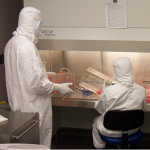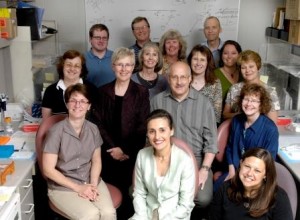
Scientists prepare clinical lots of measles virus to use in clinical trials against cancer. Credit: Mayo Clinic.
The Cancer Genome Atlas (TCGA) is undertaking a large-scale review of cancer genes. The most recent study results were published June 30, 2011, in Nature. As part of this work, TCGA investigators searched for existing drugs that might inhibit genes that were suggested to play a role in ovarian cancer. The search identified 68 genes that could be targeted by existing Food and Drug Administration-approved or experimental therapeutic compounds. As a result, investigators found that 50 percent of ovarian cancer tumors might be responsive to drugs that exploit the genetic instability of cancer cells.
But the TCGA results also point out the need to study other approaches to treatment. An example of such is a modified virus that is made by inserting specific genes into the attenuated, or weakened, Edmonston measles vaccine strain. This type of engineered measles virus has emerged as a novel therapeutic agent against ovarian cancer because of its antitumor efficacy and safety record in humans
Scientists at the Mayo Clinic, Minn., have developed this therapy to treat women with recurrent ovarian cancer. They engineered the measles virus to attack tumor cells and leave healthy cells unharmed, and then tested the new strain in cancer patients in a phase I clinical trial, which showed the treatment to be safe and well-tolerated.
“Within a three year period, we pioneered the use of a modified measles virus against ovarian cancer, moving our discovery from bench research to the first clinical trial of its kind,” said principal investigator Evanthia Galanis, M.D., an oncologist and chair of the Mayo Clinic Department of Molecular Medicine. “This rapid translation offers patients with a difficult to treat cancer a promising new therapy.”
The research in these studies was conducted at the Mayo Clinic Cancer Center and was supported by a NCI Specialized Program of Research Excellence (SPORE) grant that focuses on ovarian cancer. A summary of their studies follows.
Measles virus strains use surface receptor protein to gain entry into cancer cells
The Edmonston measles virus strains enter cells via the surface receptor CD46, a type of protein that works with the immune system to protect cells against destruction. CD46 is over-expressed in many cancer types, including ovarian cancer, as compared with normal cells.
Upon entry into CD46-expressing cells similar to ovarian cancer cells, the virus strain begins to replicate and causes a virus-induced cell-to-cell fusion that results in the development of syncytia (giant cells with multiple nuclei) that eventually cause cell death. Because of the low level of CD46 expression in normal cells, syncytia formation does not occur, so normal cells are spared. The difference in this expression explains the efficacy of the Edmonston strain in killing tumor cells, according to the scientists. This type of virus is called an oncolytic virus, since it lyses, or destroys, tumor cells.
After performing their experiments in the lab, the scientists wanted to test the safety of oncolytic viruses in mice. But since rodents do not express the measles receptor gene CD46, they were not appropriate models for study without first genetically engineering a mouse strain to express the CD46 gene. This was done in the laboratory of Roberto Cattaneo, Ph.D, also of the Molecular Medicine Department, using a yeast artificial chromosome cloning technique.
In addition to the mouse studies, toxicology studies of the oncolytic viruses were also conducted in a measles-susceptible primate species. No evidence of toxicity was observed after administration of the virus in these animal models, which provided additional reassurance that the cancer-fighting measles virus platform would be safe to use in people.
Phase I clinical trial results show that a modified measles virus can safely treat ovarian cancer patients
The investigative team of Galanis, Kah Whye Peng, Ph.D., and Lynn Hartmann, M.D., successfully tested the safety of their measles virus strain in patients with recurrent ovarian cancer in a phase I clinical trial. The virus used in this trial carried an additional tag—a marker protein called carcinoembryonic antigen, or CEA.
CEA is used to monitor the spread of infection in patients’ tumors after they received the measles virus-CEA construct. CEA is found in many different cells of the body and it is often associated with tumors. However, ovarian cancer cells rarely expresses CEA, so detection of CEA after treatment is indicative of virus infection.
Results from the trial showed safety and tolerability of the measles-CEA construct with some evident biological activity; 14 of 21 (67 percent) heavily pretreated patients, i.e., those who had received chemotherapy prior to the trial, had stable disease for up to eight months. In addition, median survival doubled as compared to the expected survival for this patient group. These results now allow administration of higher and potentially even more effective viral doses, according to the scientists.
FDA approves extension of phase I clinical trial to test new gene in measles virus combination
The investigative team has received FDA approval to extend their phase I clinical trial to include 16 additional patients, who will receive a new virus, measles virus-NIS. This construct includes the sodium iodine symporter (NIS) gene, which traps radioactive iodine and will therefore allow imaging of the sites of viral gene expression in vivo (within the living body).
This study will determine whether measles virus-NIS construct has a safety profile similar to measles virus-CEA construct and will establish the feasibility of using measles virus-NIS expression to facilitate tumor imaging. The use of radioactive iodine may also increase the efficacy of oncolytic viral therapy. The first eleven patients have been treated without significant toxicity.
Stem cells tested to augment measles virus delivery
Because anti-measles virus antibodies may neutralize the virus and therefore limit the effectiveness of the virotherapy, Galanis and Peng are testing the use of mesenchymal stem cells (MSC) as carriers for the measles virus in order to augment the anti-tumor effects. MSCs are multi-potent stem cells that can differentiate into a variety of cell types. A new clinical trial using fat tissue-derived MSC as measles virus carriers in ovarian cancer patients is being planned.
Other strategies to modify the anti-viral immune response, such as use of the immunosuppressive agent cyclophosphamide, are also being tested.
Next steps
In addition to the ovarian cancer trial, the modified measles virus is being tested in glioblastoma multiforme (brain cancer) and multiple myeloma clinical trials at Mayo Clinic. Clinical trials for mesothelioma (tumor of the lining of lungs, heart and abdomen) and head and neck cancer will soon be started.
“There are few safe and effective treatments for recurrent ovarian cancer,” said Toby T. Hecht, Ph.D., acting associate director of NCI’s Translational Research Program, Division of Cancer Treatment and Diagnosis. “We are looking forward to seeing the results of further studies with this innovative oncolytic approach to cancer therapy, not only for ovarian cancer, but other cancers as well.”
 Print This Post
Print This Post
 NCI NewsCenter
NCI NewsCenter NCI Budget Data
NCI Budget Data Visuals Online
Visuals Online NCI Fact Sheets
NCI Fact Sheets Understanding Cancer Series
Understanding Cancer Series
[...] a virus-induced cell-to-cell fusion that results in the development of syncytia (giant cells with Multiple nuclei) that eventually cause cell death. Because of the low level of CD46 expression in normal [...]